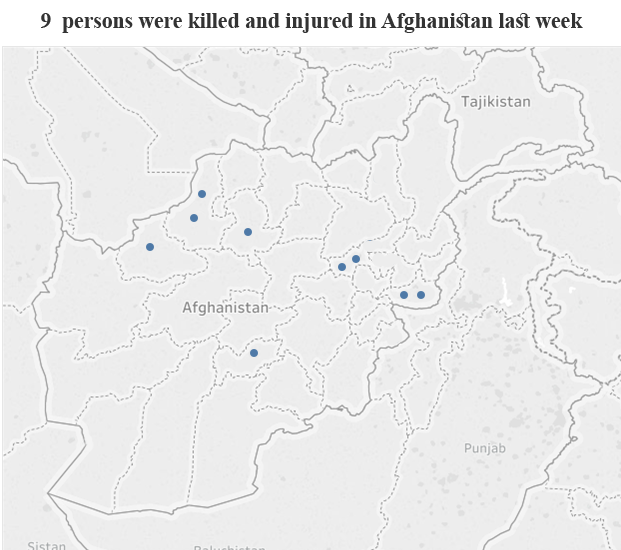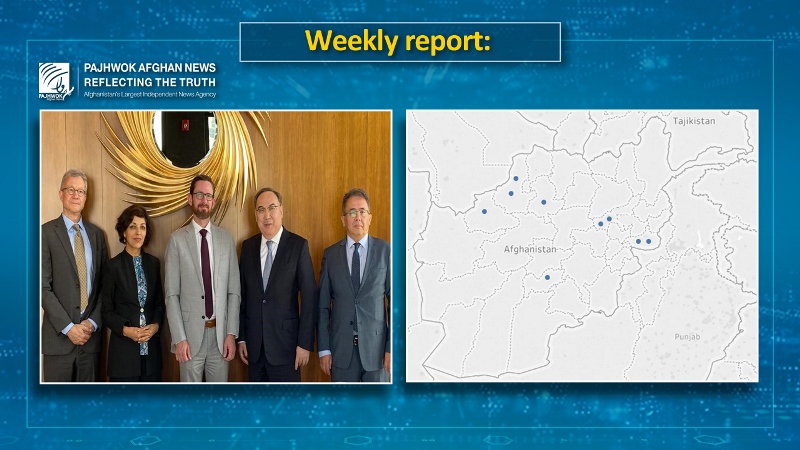KABUL (Pajhwok): Pakistan’s special representative for Afghanistan Asif Durrani last week discussed the Afghanistan interim government’s recognition with UN special coordinator Feridun Sinirlioğlu.
Also last week, Maulvi Abdul Kabir said the world has no option, but to interact with the Islamic Emirate and UNSC claimed Al Qaeda has 400 affiliates in Afghanistan, a claim rejected by the Islamic Emirate.
Last week’s major events
- Asif Durrani talks IEA recognition with Sinirlioğlu
- Maulvi Kabir: World has no option but to interact with IEA
- Amiri: World should stand with Afghan girls and women
- HRW: Women’s rights be prioritized in Afghanistan report
- Haqqani: Reasonable solution to girls’ education being found
- MoFA rejects USAID report
- UNSC: Al-Qaeda has 400 members in Afghanistan, Mujahid denies
Casualties
Seven people were killed and two others were injured in separate incidents of violence across the country last week.
Unknown gunmen killed a man in Sari Pul province, a woman was killed in Parwan and a landmine blast injured a shepherd in the same province.
Two families clashed in eastern Nangarhar province, leaving one person dead and another wounded. In a similar conflict between two families in Uruzgan, one person was killed.
Last week, a girl was shot dead in Badghis, a person shot her father in Faryab, and another person shot her sister in the same province.

Note: These figures are based on reports reaching Pajhwok Afghan News. Some incidents may have gone unreported or sources provided incorrect figures.
In the previous week, 13 people were killed and nine others were injured in various incidents across the country.
Before the regime change in August 2021, hundreds of civilians, insurgents and security forces would get killed and wounded every week.
Interaction, recognition
Pakistan’s special representative for Afghanistan Asif Durrani met United Nations special coordinator for Afghanistan Feridun Sinirlioğlu and discussed with him the recognition of the caretaker government in Afghanistan.
The two sides also conferred on women’s rights, banking restrictions, frozen assets and humanitarian crisis in Afghanistan.
Islamic Emirate spokesman Zabihullah Mujahid said that recognizing the Islamic Emirate was in the interest of all countries.
“Our advice is that countries should move forward with the Islamic Emirate through political interaction and recognition.”
Deputy foreign minister for political affairs Maulvi Abdul Kabir has said the world has no other way but to interact with the Islamic Emirate.
He said the Islamic Emirate was also looking for a positive interaction with the world.
Former ambassador to Pakistan Mullah Abdul Salam Zaeef has said the Islamic Emirate needed to interact with the world and the international community should change its policy in this regard.
America and Central Asian countries
US special representative for Afghanistan Thomas West held a meeting with representatives from five Central Asian countries — Kazakhstan, Kyrgyzstan, Tajikistan, Turkmenistan and Uzbekistan – in Astana.
The discussions centered around the joint support of the Afghan people, tweeted West after the meeting.
He thanked each of them for meaningful discussions on important issues, including security, human rights, economic and humanitarian needs.
Women’s rights and girls’ education
Rina Amiri, US special representative for human rights in Afghanistan, said Islam had given safe place to women’s rights and asked the world to stand with Afghan women and girls.
He said: “The visit to the United Arab Emirates and recent talks and interactions with representatives of Albania, Bangladesh, Morocco, Saudi Arabia, the Organization of Islamic Cooperation and Tunisia were hope-giving. These representatives said that women’s rights are protected in Islam and are important for economic development.”
Heather Barr, associate director of the Women’s Rights Division at Human Rights Watch, has asked the United Nations that human rights in Afghanistan, especially those of women and girls, should be at the center of a UN Security Council-mandated independent assessment of the global response to the country’s crisis.
“The situation in Afghanistan right now is the most serious women’s rights crisis in the world,” said Heather Barr.
Afghanistan government officials have always said they are committed to the rights of girls and women within the framework of Sharia.
Acting Interior Minister Sirajuddin Haqqani has said work is underway to find a reasonable solution to the opening of girls’ closed schools and universities.
Similarly, Mullah Abdul Salam Zaeef has said no religious scholar in the world is against girls’ education.
Meetings, visits related to Afghanistan
US Secretary of State Antony Blinken and Pakistan Foreign Minister Bilawal Bhutto Zardari last week reaffirmed their desire to continue close cooperation for lasting peace and stability in Afghanistan.
Also US and Qatar discussed the recent situation in Afghanistan, especially humanitarian aid to Afghans, among other topics.
Reports say Qatari Foreign Minister Sheikh Mohammed bin Abdulrahman Al-Thani and his UK counterpart James Cleverly discussed the situation in Afghanistan and the importance of international community’s support to Afghans.
Islamic Emirate spokesman Zabihullah Mujahid welcomed positive efforts of the United States regarding Afghanistan and asked Washington to resolve issues through dialogue and diplomatic channels instead of creating hurdles.
Claims and government’s response
A report commissioned by the US Agency for International Development (USAID) claims that the Taliban see UN aid as another revenue stream.
But Ministry of Foreign Affairs rejected the report and said it was in conflict with the facts. “We strongly reject it.”
The ministry said the Islamic Emirate as a responsible government has not only provided necessary facilities for international humanitarian aid, but also assisted hundreds of thousands of needy people every year from its domestic revenues despite all unilateral and illegal sanctions.
A monitoring report submitted to the UNSC said Al-Qaeda was using Afghanistan as an ideological and logistical base to attract new fighters and to rehabilitate its operations abroad.
The report estimated that Al Qaeda core in Afghanistan remained stable at 30 to 60 members, while all Al Qaeda fighters in the country were estimated to be 400, reaching 2,000 with family members.
However, Zabihullah Mujahid rejected the report as untrue and said Al Qaeda had no presence in Afghanistan.
Mujahid added the Islamic Emirate did not allow anyone to use Afghanistan’s territory against any other country.
ma








GET IN TOUCH
NEWSLETTER
SUGGEST A STORY
PAJHWOK MOBILE APP